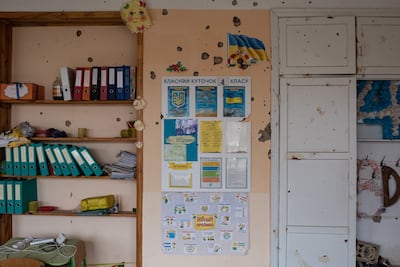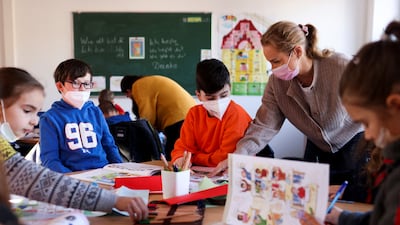Education is not doomed for a generation of young Ukrainians despite the Russian invasion displacing countless pupils and forcing millions more to flee abroad, a minister said.
About 1,500 educational institutions have been damaged in the nine weeks of war and more than 100 facilities have been completely destroyed, Ukraine’s deputy minister of education and science said.
But Dr Oleksii Shkuratov said despite the enormous upheaval the conflict poses to the education of children and adults, all is not lost on the education front.
At an online seminar on Wednesday, Dr Shkuratov said it would be “biased and wrong” to suggest education would go down the drain for generations of Ukrainians as a result of the war.
While he acknowledged the huge psychological stress the war had put on learners, from pre-school children up to university students, he said: “I don’t think education is lost for this generation of our children.”
The Kyiv administration is determined to make “every effort to restore Ukrainian education as soon as possible”, he said.

Classes are being conducted online and many students, including those who have sought refuge oversees, can access lessons led by their teachers, he said. However, there are obstacles for some people in continuing their usual lessons and many left home in a hurry and did not take laptops and schoolbooks with them.
Ukrainian teachers continue to receive salaries regardless of whether they are able to conduct classes or not, he said. “Security for students and teachers is our key priority,” he said.
Dr Shkuratov urged host countries to integrate Ukrainian students into their curriculums while also making efforts to ensure they had access to online lessons in their native country.
Ukrainian students inspire Irish teachers
Mary Immaculate Secondary School in the rural village of Lisdoonvarna in western Ireland is one of the many Irish schools that have accepted an influx of Ukrainian students since the start of the war.
About 60 Ukrainian teenagers joined the school’s ranks in early March after their families were offered refuge in Ireland and given accommodation in County Clare.
Overnight, the number of students on the school’s rota jumped by almost a quarter.
Initial tests carried out to measure the newcomers’ abilities surprised teachers, with the Ukrainians performing well in several subjects, particularly maths and science.
“They really were inspirational and they immediately made such a strong impression on our staff,” said school principal Mona Hynes.
About half of the Ukrainian students spoke a proficient level of English and were immediately integrated into mainstream classes alongside Irish students. The other half are being offered English classes in the hope that they will be able to join their counterparts in the coming months.
The Ukrainians have been offered digital platforms to access classes from Ukraine but are “still very interested in learning about the Irish system” Ms Hynes said. She said the continuation of learning for refugees will contribute to their healing from trauma.
“Yes there’s trauma, no doubt, and that will be evident, but we feel that the welcome and continuation of education will go a long way to alleviating the extent of that.”

Fears of rejection
Polina Shevchenko was one of millions of Ukrainians pondering their future as a refugee after fleeing her home city of Odesa in the early days of the invasion.
The teacher and qualified interpreter who is fluent in Ukrainian, Russian and English, found her feet by landing a job at Mary Immaculate Secondary School to help new pupils navigate the Irish system.
“It took me a while to understand that I need to go to an English-speaking country. This is my tool, this is what I can do,” she said.
The two main fears of young Ukrainians thrust into Irish classrooms are the possibility of not being accepted by their new peers and issues with communication owing to the language barrier.
But despite the challenges ahead for the youngsters and their new Irish teachers, Ms Shevchenko said the Irish people's welcome for Ukrainians had been overwhelming.
“From the bottom of my heart I want to say thank you very much for accepting us into your community,” she said.


